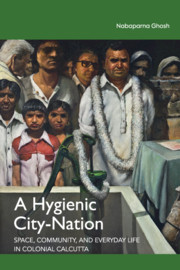Book contents
- Frontmatter
- Contents
- List of Figures, Tables, and Boxes
- List of Abbreviations
- Acknowledgements
- Introduction
- 1 The Black Town, Spaces of Pathology, and a Hindu Discourse of Citizenship
- 2 The Calcutta Improvement Trust: Racialized Hygiene, Expropriation, and Resistance by Religion
- 3 A City-Nation: Paras, Hygiene, and Swaraj
- 4 A New Black Town: Recolonizing Calcutta’s Bustees
- Epilogue
- Glossary
- Bibliography
- Index
Introduction
Published online by Cambridge University Press: 26 June 2020
- Frontmatter
- Contents
- List of Figures, Tables, and Boxes
- List of Abbreviations
- Acknowledgements
- Introduction
- 1 The Black Town, Spaces of Pathology, and a Hindu Discourse of Citizenship
- 2 The Calcutta Improvement Trust: Racialized Hygiene, Expropriation, and Resistance by Religion
- 3 A City-Nation: Paras, Hygiene, and Swaraj
- 4 A New Black Town: Recolonizing Calcutta’s Bustees
- Epilogue
- Glossary
- Bibliography
- Index
Summary
In July 1925, the opening of a beef shop in Mudialy, in south Calcutta, ledto loud protests in the neighbourhood. It was the store'slocation—a three-minute walk from both Hindu and Muslimhouses—that triggered the protests. Sheikh Keramat Ali, a meatseller, had opened the shop after local Muslims complained that there werenot enough beef stores in the region. Although Muslim neighbours welcomedthe store, Hindus complained that it was an affront to their religion. Theygrouped together, protesting that there were already enough beef stores inthe city, and a new one was not needed. Two Hindu gentlemen, leaders ofassociations that oversaw health and hygiene in the locality, demanded thatAli close his store. They explained that the Hindus on their way to work hadto pass by the store every morning, and that the sight of beef, placed ondisplay, offended their religious sentiments. The growing, frequentlyviolent protests forced Ali to close his store.
A few years before this incident, the nationalist Swaraj party had defeatedthe British in the Calcutta municipal elections of 1923. When the Swarajiststook over the city's administration, the Indian city dwellers hopedthat after two hundred years of British colonial rule, they would enjoyequal rights to the city. The protests against Ali's beef shop,however, revealed a different reality. The protests showed that theHindu-Bengali city dwellers exerted a powerful influence over theirneighbourhoods, suspending the needs of other communities. Hindu neighboursorganizing to pressure Ali into closing his store did invoke city laws toshow that the beef shop was indeed outside the space assigned for suchstores. Yet pointing out the violation of law was only a small part of theirprotests. Much of their protest centred on how a beef store was culturallyinappropriate in a neighbourhood where Hindus lived.
Theorizations of the ‘colonial city’—particularly thoseelaborated by historians and architectural historians—have discussedhow race segregated the colonial city into enclaves of the European (white)town and Indian (black) town. Scholars have, however, also explored whetherthere existed easy passages between these two zones. But how was spaceorganized within the black town and how did it differ fromimperial urban spatial organization?
- Type
- Chapter
- Information
- A Hygienic City-NationSpace, Community, and Everyday Life in Colonial Calcutta, pp. 1 - 24Publisher: Cambridge University PressPrint publication year: 2020



